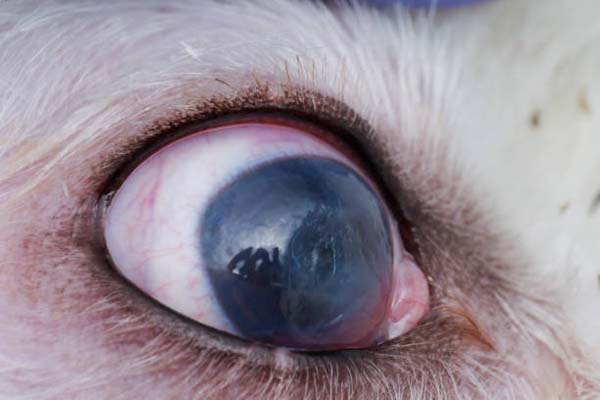Pet Corneal Ulcers in Spring, TX
Ensure your pet’s eye health with our expert care for pet corneal ulcers at North Houston Veterinary Ophthalmology in Spring, TX..

Pet Corneal Ulcers
Ensuring the eye health of our pets is vital for their overall well-being, and managing ulcers that manifest on their eyes is especially crucial. At North Houston Veterinary Ophthalmology, we specialize in diagnosing and treating pet corneal ulcers, reducing these distressing growths and restoring your companion’s quality of life. Our dedicated team provides expert care to help maintain your pet’s vision and comfort.

Understanding Pet Corneal Ulcers
What is a Corneal Ulcer?
A corneal ulcer disrupts the cornea’s layers, ranging from superficial to deep and even perforating. Prompt recognition and treatment are crucial to prevent complications and preserve your pet’s vision.
Signs of a Corneal Ulcer
Corneal ulcers are extremely painful due to the cornea’s high sensitivity. Signs include squinting, excessive tearing, rubbing the eyes, and avoiding light. Redness, cloudiness, and eye discharge are also common. If your pet exhibits these symptoms, seek veterinary care immediately.
Causes of Corneal Ulcers
Trauma is the most common cause of corneal ulcers in pets, resulting from scratches, foreign objects, or accidents. Other causes include eyelid abnormalities such as eyelid masses, improper eyelash growth (distichia), misplacement of eyelashes (ectopic cilia), inward rolling of the eyelid (entropion), decreased tear production (keratoconjunctivitis sicca), improper blinking (lagophthalmos), and loss of corneal innervation (neurogenic keratitis).
Treatment Options for Pet Corneal Ulcers
Medical Treatment for Superficial Ulcers
The treatment for corneal ulcers varies with their severity. Uncomplicated superficial ulcers are typically treated with antibiotic eye drops to prevent secondary infections and oral medication to alleviate pain. With proper care, these ulcers usually heal within a week.
Addressing Complicated Ulcers
Superficial ulcers that do not heal within a week or recur frequently may indicate underlying issues such as eyelid abnormalities or keratoconjunctivitis sicca. Identifying and treating these complicating conditions is essential for successful ulcer resolution, or the ulcer may be indolent, which is a unique type of corneal ulcer. This may involve adjustments in medical therapy or the need for a procedure or surgery to address the underlying issue that is preventing the resolution of the ulcer.
Surgical Management of Deep Ulcers
Deep corneal ulcers, which extend half-way through the corneal thickness, require surgical intervention along with medical therapy for a successful outcome. Led by our skilled veterinary team, surgical treatments at North Houston Veterinary Ophthalmology have a high success rate, resulting in a comfortable and often visual eye. Procedures may include grafting techniques or other advanced surgical methods to promote healing and restore corneal integrity.
Perforating Ulcers
In severe cases, an ulcer may progress to a full-thickness defect, causing a corneal perforation. This situation is a medical emergency requiring prompt surgical and medical intervention to save the eye and potentially restore vision. Our experienced team is equipped to handle these critical cases, providing the best possible care to achieve a favorable outcome.
When to Seek Veterinary Care
Seek veterinary attention as soon as you notice signs of a corneal ulcer in your pet. Early intervention can prevent worsening and reduce the risk of complications. Regular eye check-ups are also beneficial, especially for breeds prone to eye issues or pets with existing conditions that could predispose them to corneal ulcers.
Expert Pet Corneal Ulcer Care
Choosing North Houston Veterinary Ophthalmology for the treatment of pet corneal ulcers ensures your pet receives expert care from a dedicated team of veterinary ophthalmologists. We combine advanced diagnostic tools with compassionate care to provide the best outcomes for your pet. If you suspect your pet may have a corneal ulcer, contact us for an appointment.